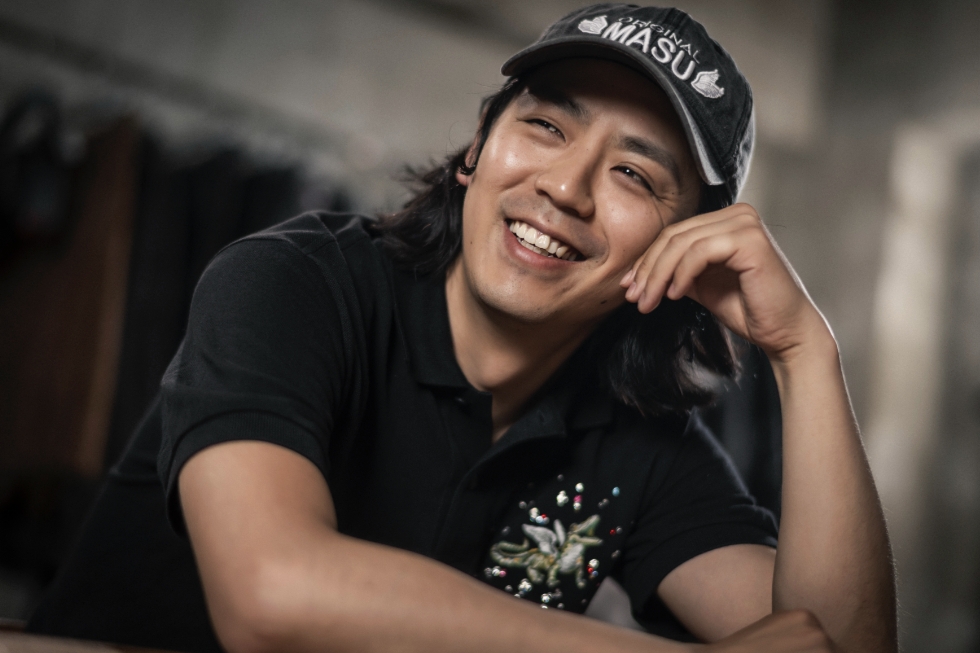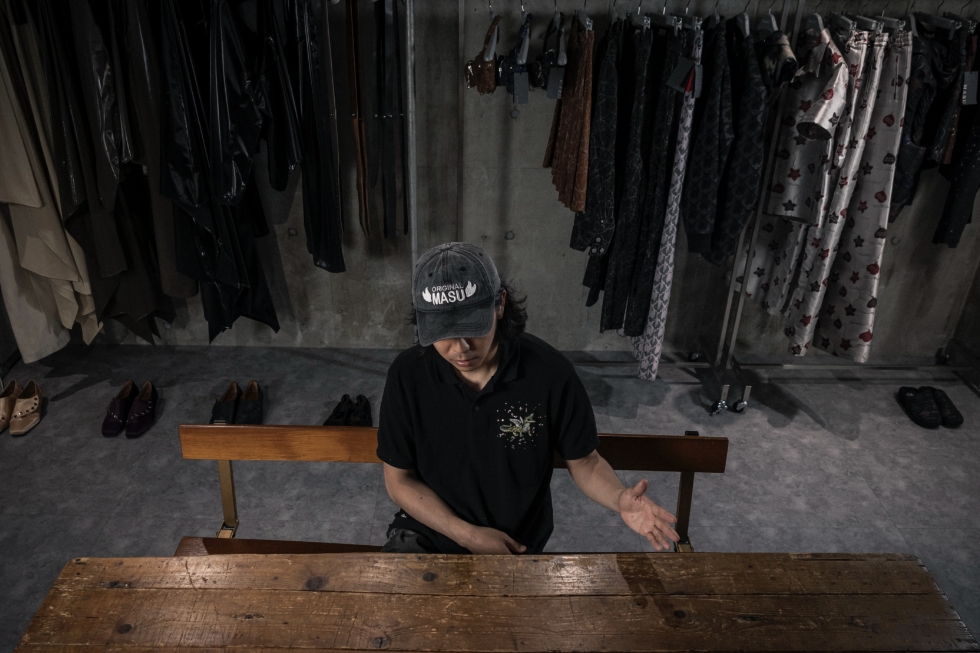WINNER INTERVIEW
後藤愼平 / Shinpei Goto
エムエーエスユー / MASU

Q. 小さい頃からデザイナー志望でしたか?
デザイナーになりたいという強い気持ちがあったというより、漠然とデザイナーになるんだろうなぁと思ってました。絵描くことが好きでしたし、欲しいと思えるものがあまりなくもっとこうだったらいいのにと思うことが多くて、自然とデザイナーの道を歩んでいました。ものづくりをしたいという気持ちがずっと強かったですね。
Q. Have you always wanted to be a designer since an early age?
- ERather than having a strong desire to be one, I had a vague thought I would become a designer. I loved to draw, and I often wished there were more of what I wanted, so I naturally took the path of a designer. I have always had a strong desire to create things.
Q. 後藤さんにとって、ファッションとは?
洋服に救われた経験もあるのでとても大事なものと言いたいけど、ファッションに対するハードルは上げたくなくて。自分の使い方次第で自由にどうぞと。洋服は人を悲しませたり傷つけたりするようなツールではなく、生活、人生を豊かに楽しくしてくれるものだと思っています。
Q. What does fashion mean to you?
I would like to say it is very important because I have experienced salvation through my clothes, but I don't want to raise the hurdle for fashion. I want everyone to be free to use it as they see fit. I believe that clothing is not a tool that makes people sad or hurt, but rather something that enriches life and makes living joyful.

Q. お客様との関係性が他ブランドとは異なるように感じます
全ての商品に対して商品説明文を書くのですが、それをしっかり伝えてくれるお店があって、しっかり読み込んでくれるお客さんがいてくれる。自分よりも商品のことよく覚えてくれていたり。そういうお客さんたちに向けて「MASU BOYS」というネーミングを提案したんです。呼び名をつけることで一体感や仲間意識が芽生えたらと思いましたし、ファッションでもそういうのがあっても良いかなと。
Q. I feel that your relationship with your customers is different than with other brands
I write product descriptions for all of my products, our stores communicate them well, and we have customers who read them carefully. They remember the products better than I do. I proposed the name "MASU BOYS" for these customers. Naming things develops a sense of unity and camaraderie. I thought it would be good to have such a thing in fashion as well.
Q. 東京のファッションマーケットをどう見ていますか?
ぐるぐる回っている印象で、先に進もうとしている人が少ない。成熟していて、何が売れるか成功できるか統計的に分かり真似が出来る時代で、SNSを使ってブランドの規模関係なくモノを作って売れる。この状況はとてもぬるいし、終わっていくと思っていて。僕としては完成されているカルチャーや現状に不満を持つ人が増えて良いと思うし、もっと強いことが出来る人が増えてほしい。
Q. How do you see the fashion market in Tokyo?
I get the impression that it is going around in circles and not many people are trying to move on. It is a mature market where it is statistically possible to know what will sell and what will succeed, and it is possible to imitate others. Social networking is used to create and sell products regardless of the size of the brand. This situation is lukewarm and surely is going to end. I think it's good that more people are dissatisfied with the completed clothes culture and the status quo. I want more people to be able to do something stronger.
Q. 現在のビジネス概況を教えてください
国内は約40店舗、海外は約10店舗の取引先があります。国内は安定していて1店舗ずつの受注を伸ばしていく段階ですが、海外はまだまだこれからという状況です。パリでのショーを経て、既存店の買付額と新規卸先が増えましたね。
Q. What is your current business overview?
We have approximately 40 domestic stores, and 10 stores overseas as business partners. While the domestic market is stable and we are growing one store at a time, the overseas market is still in its infancy. After the Paris show, purchases from existing stores and new wholesale customers have increased.

Q. 今年1月のパリでの初めてのショー、感触はいかがでしたか?
初回はお客さん来てくれないだろうから2回目のショーが勝負だと思っていて。面白いブランドがショーをやっていたという話題を作って2回目に繋げられたらと成功だと考えていました。しかし、実際には初回にも関わらずたくさんの方が来てくれて、現地メディアからのインタビューも多く反響も大きかった。ショーが終わった瞬間から多くの課題を感じましたが、良いデビューだったのかなと思っています。
Q. How did you feel about your first show in Paris this January?
I thought that the second show would be the charm, since nobody comes to the first show. I thought it would be enough if we could create a buzz that an interesting brand was now doing shows, and get them into the second show. In fact, many people came even though it was the first time. The response was great, with many interviews from the local media. I felt many challenges from the moment the show ended, I think it was a good debut.
Q. どのようなところに課題を感じましたか?
デザインもショーも、ディテールで言い始めたらキリがないほど全部足りていない。ですが、そう感じられたことに、ブランドとしての伸び代を再確認できて。今のクリエイションに満足もしているけど、今が完成ではなくて、ここから先ブランドをまだまだ良くすることができるなと思いましたね。
Q. In what areas did you find challenges?
The design, the show itself once you start talking details, you realize all the things that are lacking. But the fact that I felt that way made me see the potential for growth as a brand. I am satisfied with my current creations, but I feel that the present is not the end. I feel that the brand can be further improved from this point on.
Q. 3月の東京での凱旋イベントにはどのような狙いがありましたか?
パリのショーで起きた現象を日本のお客さんに体感してもらいたくて、ルックを着たマネキンと共にショー映像を観るという体験型のプレゼンテーションにしました。楽しんでもらえましたし、一般のお客さんにも多く来場してもらえて、コレクションの全ルックをじっくり見てもらえる機会を作れて良かったと思います。
Q. What were your aims for a triumphal return to Tokyo in March?
I wanted Japanese customers to experience the phenomenon that occurred at the Paris show. So we created an interactive presentation in which they could watch the show video with mannequins wearing Looks. They enjoyed the show. I am glad we were able to attract a large number of visitors from the general public. Also that we could create an opportunity for them to take a closer look at all the Looks in the collection.
Q. 6月19日に控えている、2度目のショーに向けて意気込みを聞かせてください
ファッションの文脈で触れにくい部分がテーマになっています。今の自分だからできる表現に挑戦しています。新しい服を着たくなるショーになると思いますので、楽しみにしてください。
Q.How enthusiastic are you for your second show, coming up on June 19?
The theme is about areas that are difficult to touch in the context of fashion. I push myself to self-express, because I have become the person I am today. Please come to the show, which will make you want to update your wardrobe.

Q. FPTを受賞してみていかがでしたか?
数年前から「今注目の」「これから来る」ブランドとして紹介されていたのですが、FPTを受賞し公に良いブランドであると認められた感覚があり、とても自信になりましたね。FPT受賞によってパリでショーを開催することが出来ましたが、パリでショーを発表し続けること自体にも疑いを持っていて、今はそのシステムを試しているという感覚に近い。ファッションの王道ではないけれど、東京でMASU BOYSを乗せてバスツアーをするなど、MASUらしい見せ方を模索し続けて行きたい。
Q. How did you feel about receiving the FPT?
For several years, the brand had been introduced as a "hot" or "coming soon" brand. Winning the FPT award gave us a sense of being publicly recognized as a good brand, which gave us a lot of confidence. The FPT award allowed us to hold a show in Paris. However, I have doubts about continuing to put on shows in Paris itself; I almost feel like I am testing the system. I would like to continue to search for ways to present MASU in a unique way, such as a bus tour in Tokyo with the MASU BOYS, even though it may not be the high road of fashion.
Q. ブランドとして今後の展望は?
僕がやりたいこと、表現は毎シーズン変わっていて。その変化を楽しめる人が今ブランドを支えてくれています。スタイルや色が一定なコレクションブランドが多い中、ブランドとしてのコアな部分は変えないけれど、自由な変化、振り幅のあるMASUがパリでこれからどう評価されるのかなと思っています。僕にはもっともっと作りたいものがあるから、MASUのものづくりは常に変化する。一般的に成功するブランドのセオリーは別にあると思うが、それでは新しい存在にはなり得ないし変化を肯定できるブランドでありたい。
Q. What is the outlook for the brand?
What I want to do, and how I want to do it, changes every season. People who enjoy that change are now supporting the brand. There are many collection brands with their own certain style and color. MASU does not change the core of the brand, but changes freely and has a range of swing. I wonder how this will be evaluated in Paris in the future. I have more and more things I want to make, so MASU's manufacturing process is always changing. There is another theory of successful brands in general, but that doesn't make them new. I want to be a brand that can affirm change.
僕はスカートもキャミソールも作るしスパンコールも使う。そういうフェミニンな要素を持つ洋服も日本の市場では普通に受け入れてもらえるが、ヨーロッパの市場からすると、MASUのコレクションはカテゴライズできない要素が多くモヤモヤを感じると思う。そのモヤモヤした曖昧さを海外でも受け入れてもらえるようになったら勝ちだなと思う。次のチャレンジはそういうことかな。考えることをやめないで、挑戦を続けていきたい。
I make skirts and camisoles, and I use sequins. Clothes with such feminine elements are usually accepted in the Japanese market. From the European market, however, I think MASU's collection is a blur with many elements that cannot be categorized. If that fuzzy ambiguity can be accepted overseas, I think it would be a win-win situation. I guess that's the next challenge. We want to keep challenging ourselves and never stop thinking.change.

Q. MASUが目指す新しい存在とは?
コミュニティでありたい。洋服があって、洋服をきっかけに出会えたり繋がれたり。MASUはお客さんに対して与える側という立場ではなくて、一緒にという感覚が強い。日本ではそうしたコミュニティが出来つつあるから、海外でもそうあれたら。
Q. What is the new being that MASU is aiming for?
We want to be a community. We make clothes. We can meet and connect through clothes. MASU is not so much a giver to the customers, but more like a partner with them. We are establishing such a community in Japan, and I hope it will be the same in other countries.

Interview by Tomoko Kawasaki
Photography by Daichi Saito